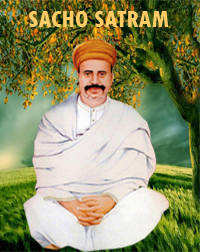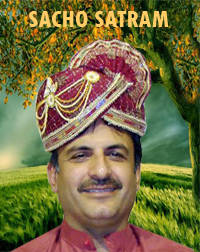During a heartfelt Satsang in the city of Machko, Sindh, held to commemorate the 115th Varsi Maha Utsav of Shahanshah Satguru Swami Sai Satramdas Saheb, Hazir Swaroop Sai Sadhram Saheb beautifully conveyed that celebrating any auspicious Utsav in remembrance of Shahanshah Satguru Swami Satramdas Saheb inspires us to live righteously and align our lives with the path of truth and virtue.
As humans, we are blessed with sensibility, knowledge, and intelligence, enabling us to observe everything with great attention to detail. We strive to understand the reasons behind every occurrence—why, where, and how it happened. Nature has gifted us with the ability to look within, to reflect on our inner self, and to embark on a journey of self-discovery to uncover our true essence.
Saijan further explained that when we give a toy to a child, the child initially plays with it in various ways—holding it in different positions, exploring its functions, and winding it up. However, after a while, curiosity takes over, and the child attempts to break the toy. This is because the child becomes eager to understand the mechanism behind its functioning. The child wants to know what makes the toy move or work, prompting the desire to open it up and discover what lies inside that enables its motion.
As humans, we have a natural tendency to understand and assess others. We observe whether people are good or bad. At times, we notice someone who speaks sweetly but may not truly be a good person, while someone else may come across as arrogant or lacking humility yet have a kind heart. Our observations extend beyond outward appearances to also perceive the inner nature of individuals.
We observe ourselves and realise that while we say one thing, we may simultaneously think something entirely different, with yet another thought hidden in our minds. It is not always necessary that our words reflect our true thoughts. At times, our intentions differ from what we outwardly express in our conversations.
We often notice that people exhibit a wide range of behaviours and traits. Some individuals are naturally humble, kind, and loving, while others tend to be fussy, arrogant, and troublesome by nature. Such individuals are rarely at peace and often disrupt the peace of others, constantly finding reasons to nag or complain.
While the physical forms of living beings change across lifetimes, their minds carry impressions from their previous births. The karmas and thought patterns shape their minds, and though they are reborn into new life forms, their minds retain similar tendencies. A mind filled with love for someone continues to harbour the same affection in the next birth, while feelings of enmity persist and carry over toward the same individual even in a new form of life.
Our behaviours, habits, manners, and bonds of friendship remain consistent even in our next life. While our physical bodies decay and perish, the mind does not die. After leaving the body, it continues its journey alongside the Atma, or soul. This is why the lifestyle and tendencies from our previous birth influence our new life. We act in alignment with a mind that has been shaped and conditioned by the experiences and impressions of our past birth.
It is very surprising that to some people we feel connected and to some people we don’t get that feeling and they are the people whom we don’t know, we have not met them before. it is all because of our mind which has the imprints of our previous birth.
Our loving and respectful connections with certain individuals in this life are a result of the shared feelings we had for each other in our previous lifetimes. Similarly, the discomfort we feel with some people stems from the imprints of past experiences. These imprints play a crucial role in shaping our current life form. Whether our behaviour is good or bad is influenced by the karmas we accumulated in previous births.
In each life, we create new karmas, and the way we live in our next life is determined by the nature of those karmas—whether good or bad—and how wisely or poorly we lived. With each birth, we continue to make new karmas, which then follow us into the next birth, perpetuating the cycle of birth and death.
Saijan says that we continue to be crushed in the grindstone of joys and sorrows, life after life. To break free from our old habits, wrong thoughts, and bad deeds, we seek refuge in the protection of Satguru. We need to surround ourselves with good people, attend satsangs, engage in seva, practice Jaap Simran, and meditate to correct our lifestyles and ultimately attain Moksha. The most effective way to control ourselves and avoid falling into wrongdoing is through Naam Jaap and meditation, as these practices help balance our breathing and calm the mind. Our mind, like the wind, moves swiftly; we can suddenly remember someone who is thousands of miles away.
Our mind and breath are like flying horses, both beyond our control. Our breath can leave us at any moment, rendering us lifeless. Only great saints, mahatmas, yogis, and enlightened masters have the ability to control their mind and breath. Though neither our mind nor breath is in our control, but they have the power to influence and control each other.
When we focus on our breath during Nem and Dhyan, we will observe that the pace of our breath gradually slows down. As our breath slows, we also notice that our mind, its thoughts, and its speed begin to slow as well, bringing our mind under control. When we practice Naam Jaap with each inhalation and exhalation, the blessings of Satguru flow through the continuous, inward repetition of the sacred Naam. This process allows our mind to receive the positive energy of the entire universe, filling us with strength and power.
Hazir Swaroop Sai Sadhram Saheb explained that through Naam Jaap and Dhyan, our breath normalises, our mind calms, and all negativity is uprooted. By then attending Satsangs, engaging in Seva, and seeking refuge under the shelter of our Satguru, our mind becomes sharpened, and we gain true wisdom.
This transformation will enable us to remain unaffected by negative individuals. We will forgive such people and move forward effortlessly, doing good for others. We will no longer be influenced by bad people, and if someone wrongs us, we will forgive them and move on, letting go of any negative thoughts. In this way, we will learn to use our mind and thoughts wisely and sensibly.
This human birth has been granted to us as an opportunity to transform ourselves into better human beings by shedding all past karmas, fate, burdens, guilt, and sins. In this lifetime, we should not carry forward our past wrong thoughts, bad behaviors, or inappropriate lifestyles. Instead, we must strive to improve our lives for our own betterment.
It is an opportunity granted to us by Nature to become better human beings. By living a virtuous life and cultivating good habits, we will make progress, ensuring that each subsequent birth allows us to continue advancing. In this way, we will remain happy and content throughout all our lives. Naam is the path that leads us to Moksha.
The habit of living a pure life will gradually lead us to spend more time in devotion to Prabhu and Satguru, as well as in Nem and Dhyan. Over time, our mind and thoughts will slow down so much that, eventually, they come to a complete halt. This leads to a state of Oneness, free from thought—known as the state of Samadhi—where we become one with Satguru.
To grasp this, we should reflect on the life of Shahanshah Satguru Swami Satramdas Saheb. When he sat in Nem, each part of his body seemed to detach.
When we sit in Nem, every part of our body, every nerve, should resonate with the inward chanting of Satguru’s sacred Naam. This state, where there are no thoughts, distractions, or mental agitation—only peace—represents the moment of Oneness, where we merge with our Satguru.
In such a sacred state, whatever a person speaks becomes true.
We can take the life of Shahanshah Satguru Swami Satramdas Saheb as an example, where whatever he spoke would come true.
As humans, we carry with us the baggage of our past, and to free ourselves from this burden, we must seek the support of Naam. This birth has been given to us as an opportunity to improve, shedding all the sins, guilt, negativeness, bad thoughts, and wrong deeds of our past lives. Hazir Swaroop Sai Sadhram Saheb emphasised that we should never let go of this precious opportunity in human form to better ourselves.
As humans, we possess the power to kill animals, birds, and other creatures, and we may even kill them for food. However, if we observe, in every religion, faith, sect, and community, suicide is forbidden and considered an offence. Those who attempt suicide are subjected to legal punishment.
Committing suicide is, in fact, a sin. As humans, we must protect our lives and avoid actions that could lead to an early death or show carelessness toward our existence. We are here to improve ourselves, to uproot the sins, bad karmas, miseries, sadness, and negative thoughts from previous births, and to make our lives better for the next birth. This way, we can attain happiness and contentment in our new life and continue progressing until we become one with our Parmatma and Satguru. Human birth is the best birth, as we are blessed with intelligence and wisdom that animals do not possess. Therefore, humans, endowed with knowledge and wisdom, must take responsibility for their own lives, care for other living beings, and protect Nature.
The true purpose of our life should be to save and improve our existence, while also respecting Nature by using its resources wisely and giving back what we take. Our human life is a divine gift, and we must live it fully through practices like Nem, Jaap, Simran, kindness, nurturing relationships, helping others, and living wisely and respectfully. By doing so, we will shed the burdens of past karmas, jealousy, enmity, and negative intentions, allowing us to live with renewed, positive energy.
Saijan wisely advised that we should reflect on and introspect about our lifestyle. We must consider how we are perceived in society—whether we are compared to animals or recognised as good, virtuous humans.
If we are seen as animals, we must be cautious and work on improving ourselves to at least be recognised as humans. However, if we are respected as good humans, it becomes our duty to further enhance ourselves, striving to become noble and ultimately attain freedom from the cycle of birth and death.
Hazir Swaroop Sai Sadhram Saheb shared that Shahanshah Satguru Swami Satramdas Saheb would say that when humans hunt a lion, they are called hunters, but if a lion kills a human, it is called a predator. Therefore, let us strive to be true human beings, not predators, hunters, or lions.
We must always be mindful of our behavior, thoughts, and actions, striving to improve ourselves to become better human beings. In doing so, we can reach the heights of divinity and ultimately become one with Parmatma and Satguru.
Hazir Swaroop Sai Sadhram saheb emphasized that We must always remember that while our body decays after death, our mind continues its journey with our Atma towards the next birth, and we continue living based on our past habits and karmas. We take birth with the same mind, carrying forward the imprints of our previous life. Therefore, it is our duty to channel the same efforts, love, and sincerity that we invest in organising grand celebrations for our Satguru into chanting Satguru’s Naam regularly, silently, and inwardly.
Additionally, we should dedicate ourselves to meditation, striving to live a better life and progress from one birth to the next.



